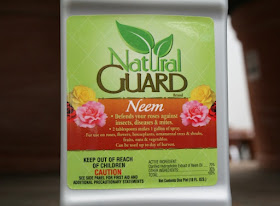Late July into August is the
time many garden diseases, such as powdery mildew,
black spot and
rust start to
show up. Vegetable gardens, shrubs and trees can be affected. Good cultural
practices can prevent a number of disease and insect problems. These include
watering in the early morning so plants don’t sit wet all night. When you water,
avoid overhead watering if you can. It’s best to water at the base of the plant
if possible. Try to avoid splashing soil up onto the leaves when you water.
This will reduce the chances of disease spreading. Make sure plants have plenty
of room to breathe. As your garden grows, plants can become crowded, reducing
the air circulation around them. Pruning excess foliage back so there is room
between plants will help with air flow. Keep an eye out for insect activity. Insects can spread diseases
from plant to plant. Even with the best soil and growing conditions, there are
times when an organic fungicide is needed. Sulfur, Neem oil, Serenade and Green Cure are
organic fungicides available to you for use in your garden.
Sulfur is a broad spectrum fungicide with an
added benefit of controlling mites and thrip. This is important because insect
activity can move diseases from plant to plant.
This liquid sulfur is listed with the
Organic Material Review Board (OMRI) for use in organic gardens.
Neem oil is
made from the seeds of the Azadirachta
indica tree. Neem oil offers good fungus control and also controls insects
and mites.
Serenade contains Bacillus subtilis,
a soil-dwelling bacterium that controls powdery
mildew, leaf blight and many other leaf diseases.
Green Cure is a concentrate you mix and apply. Green Cure will work on fungus problems in the lawn and garden. Knowing what you’re dealing
with is key. Bring a sample of your plant problems into the store and we’ll
help you decide which product is right for your garden.









No comments:
Post a Comment